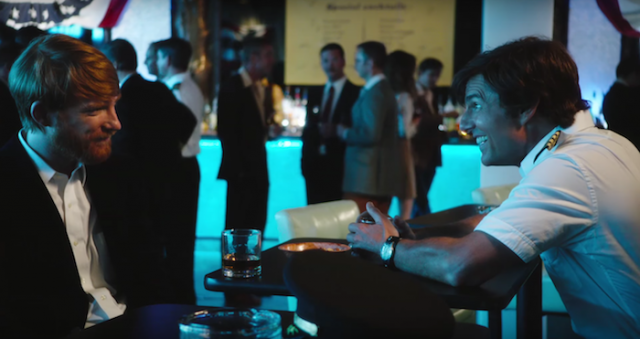
“All of this is legal?” asks airline pilot Barry Seal (Tom Cruise) in “American Made” when CIA agent Schafer (Domhnall Gleeson) recruits him to fly secret surveillance missions in Central America. “If you’re doing it for the good guys, yeah,” replies Schafer.
Mind you, when we meet Barry Seal, he’s already making a few bucks on the side smuggling Cuban cigars into the U.S. He’s a good ol’ Louisiana boy with Tom Cruise’s toothy charm. If he has any compunctions about working with the CIA, he doesn’t show them. Indeed, once he gets going, he uses the opportunity to establish a side gig running drugs for the Medellin Cartel, which leads to more off-the-books work for the CIA, including flying guns to the Contras, which eventually turns into the whole Iran-Contra Affair.
The gross illegality and questionable morality of the whole true story (well, mostly true) renders it an odd choice for an upbeat popcorn flick, but director Doug Liman (“Mr. & Mrs. Smith,” “Edge of Tomorrow”) — whose father, coincidentally, was chief counsel for the Senate’s Iran-Contra investigation — makes it crackle with entertainment value, aided by Cruise’s ability to turn a criminal into an antihero.
Cruise, as Seal, narrates the film (written by first-timer Gary Spinelli), which starts in 1978, covers much of the ’80s, and involves such colorful historical figures as Manuel Noriega, Pablo Escobar, and Oliver North. (A young-ish George W. Bush even pops up at one point.) Seal spins a good yarn, telling how he kept his wife, Lucy (Sarah Wright), in the dark about his work until the amount of under-the-table cash he was getting became too large to hide. The Seals become insanely rich, overseeing a major smuggling operation for multiple clients, and involving Seal’s idiot redneck brother-in-law, JB (Caleb Landry Jones). There’s comedy and adventure in their efforts to conceal their wealth from local authorities, and in the prickly nature of Seal’s relationship with the CIA: they’re paying him a lot of money to do a lot of work, but they’ll aggressive disavow all knowledge of it if he’s caught.
Liman covers a lot of ground, introducing us to (or reminding us of) numerous details from the Reagan Era without being overwhelming or hard to follow. But I can’t help thinking there’s a missed opportunity here, a chance to explore the intricate web of well-intentioned deceit and bald-faced greed that created so much instability in the ’80s and led directly to many of the international problems America faces today. Liman and Cruise keep things at surface level, delivering an enjoyably audacious caper but neglecting the context and subtext that could have made it something more.
B (1 hr., 55 min.; )





